Trump's election-year tangles with swing-state governors unfold amid COVID-19 confusion
Trump's relationships with battleground state governors is now in the spotlight.
As top officials across the country continue to grapple with the spread of novel coronavirus, President Trump’s public tangles with governors leading responses in key battleground states have increasingly served as tangible reminders that a presidential election is still unfolding amid the growing pandemic.
The stakes are especially high for the incumbent president as he aims to lead the nation through an unprecedented crisis, while also treading into the uncharted waters of virtual campaigning.
President Trump's daily, hours-long briefings offer an elevated national spotlight and coupled with his frequent interactions with governors, serves as potential measurements of his ability to lead both in the moment as well as into another possible presidential term.
"A great part of it is political, but part of it is public health, in the sense that if the president doesn't get this pandemic under control well before the November election then that, combined with a completely sinking economy, will sink him,” Larry Sabato, a political scientist and the director of the University of Virginia Center for Politics, told ABC News.
Campaigning for public opinion
With just under a month of recommended social distancing guidelines on the horizon, governors in 2020 battleground states will continue to play critical and highly public roles in bridging the divide between federal and state responses amid a hurting economy and experts say the president’s ultimate political success could be weighed along the way.
“The biggest political story that no one’s commented on at great length is the difference between the approval ratings on handling this crisis for the governors and those for the president,” said Allan Lichtman, a political historian and professor at American University. “We’ve never seen anything like this before in American history.”
According to the latest polling conducted by ABC News/Washington Post, nearly 60% of respondents said they thought President Trump was too slow to take action to address the early stages of the coronavirus outbreak. Overall, 51% of respondents said they approved of President Trump’s handling of the coronavirus outbreak.
Although similar polling is not currently available for every battleground state governor, a wide gap could exist in constituents’ favorability toward states’ chief executives and the nation’s top government leader.
As an example, a Marquette University Law School poll, indicates 76% of registered voters in the battleground state of Wisconsin approve of how Democrat Gov. Tony Evers has handled the coronavirus pandemic, compared to the 51% of Wisconsin registered voters who approve of President Trump’s handling of the crisis.
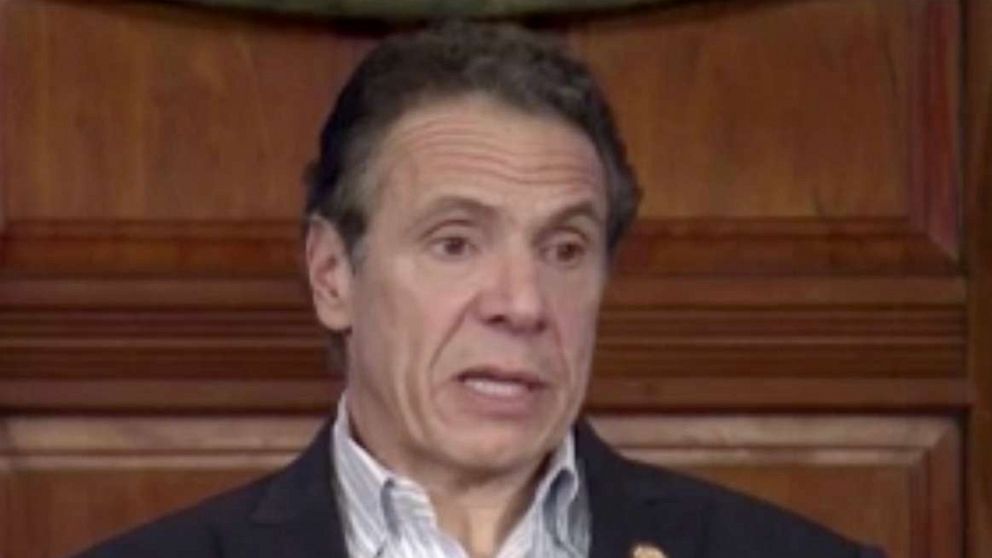
While New York is not traditionally considered a political swing state, recent polling coming out of the nation’s fourth most populous state suggests a similar gap in the perception of leadership at the state and federal level. According to a poll conducted by Siena College 87% of New Yorkers approve of Gov. Andrew Cuomo’s handling of the coronavirus pandemic, while 41% approve of President Trump’s handling of the same issue. The perception of Cuomo’s success as an executive even boosted the optics of a groundswell for a Cuomo 2020 presidential candidacy.
“I'm sure that Trump wishes he had some of those numbers but it is very different being president, and being governor, it's easier to manage your image and manage the flow of information in a state than it is the country,” Sabato said.
The New York governor repeatedly denied giving any thought to the possibility of a 2020 candidacy, but was still called out by President Trump in a cable news interview as being a better Democratic candidate than former Vice President Joe Biden. President Trump’s surmised his other Democratic opponent, Vermont Sen. Bernie Sanders, “will be dropping out soon” in a tweet more than two weeks ago.
As the president continues to sporadically jab at his actual Democratic opponents, his regular reviews of some battleground state governors’ leadership performances have also taken center stage during his press briefings.
Speaking at a press conference Saturday, President Trump appeared to speculate that a group of governors of the same party were politicizing the distribution of resources issued by the federal government.
“That’s one party doing it, and the other party is happy,” President Trump said. “But they’re all really happy because they should have been doing this work themselves for a long period of time. Many of their cupboards were bare.”
Speculation aside, the president also touts his administration’s efforts to work with all governors.
“I mean I get along with many of them because I’m doing a good job,” he said in a recent cable news interview. “They wouldn’t be getting along with me if I wasn’t producing. We’re building hospitals for people, for governors all over the country.”
While there is no evidence that the Trump administration is evaluating the distribution of federal aid along states’ political leanings, discrepancies in the type of aid apportioned across the country has led to increased tensions between the president and some of the nation’s governors.
“[Trump] is not in the position of strength when it comes to attacking the governors; they are in a vastly stronger position than he is,” Lichtman said. “It gets him nowhere either substantively or politically.”
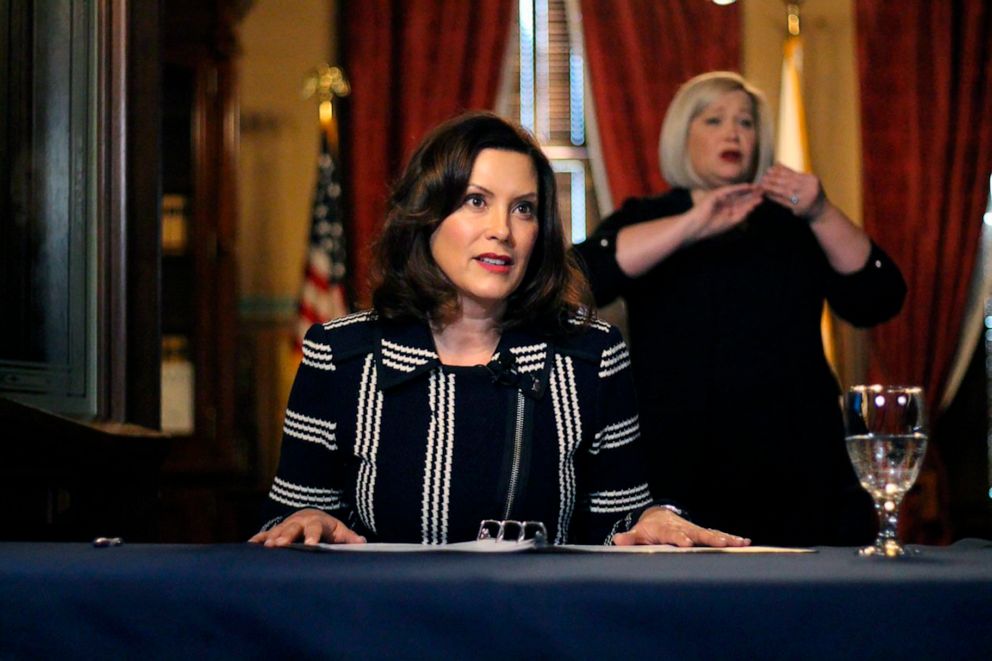
Trump and the Democratic battleground state governors
For some, Trump first fueled the flames of suspected partisanship last month when he urged Vice President Mike Pence not to call governors in affected states if they criticized the federal response. In doing so, Trump called out Democrat governors Gretchen Whitmer of Michigan and Jay Inslee of Washington.
“I mean, I’m a different type of person. I say Mike, don't call the governor of Washington. You're wasting your time with him. Don't call the woman in Michigan. It doesn't make any difference what happens,” Trump said at the time. “You know what I say? If they don't treat you right, I don't call.”
While President Trump may not be as focused on laying groundwork to win the solidly blue state of Washington, he frequently touts his 2016 win in Michigan where his interactions with Whitmer could play a factor come November.
“I think he made a profound mistake going after Gov. Whitmer in going after the state of Michigan -- that was one of the critical states that he wasn't expected to win, and that he did win in 2016 that put him over the top,” Lichtman said, adding “You would think the last thing that he would want to do would be to disrespect a very popular governor of that state and make it look like he doesn't care about the people of Michigan."
For her part, Whitmer -- who delivered the Democratic response to President Trump’s State of the Union in February -- alluded to the president’s remarks rather than overtly pushing back.
“Not having a national strategy where there is one policy for the country as opposed to a patchwork based on whomever the governor is something that I think is creating a more porous situation where Covid-19 will go longer and more people will get sick and sadly more lives get lost,” Whitmer said in an interview on Fox News Sunday.
The Michigan governor was specifically asked to weigh in on the president’s personal attacks aimed her way -- Whitmer insisted she would rather speak to policy rather than politics.
“None of the comments that I've made have been a personal attack in nature. I don't do that kind of thing,” Whitmer said. “I got elected in the state that voted for President Trump in 2016 and then voted overwhelmingly for me. I won by almost ten points in 2018. I don't wage for those kinds of political attacks.”
Despite indicating that she believes better federal policies could be instituted, Whitmer denied a war of words and said she’s thankful for the response her state has received.
“I've spoken with the president, I've spoken with the vice president many times, the Army Corps, FEMA, and we are grateful for any federal partnership we can get,” Whitmer said. “I'm doing my job and part of my job is telling people what I've learned, what I think we can do better, and what we are going to continue to do to protect people.”
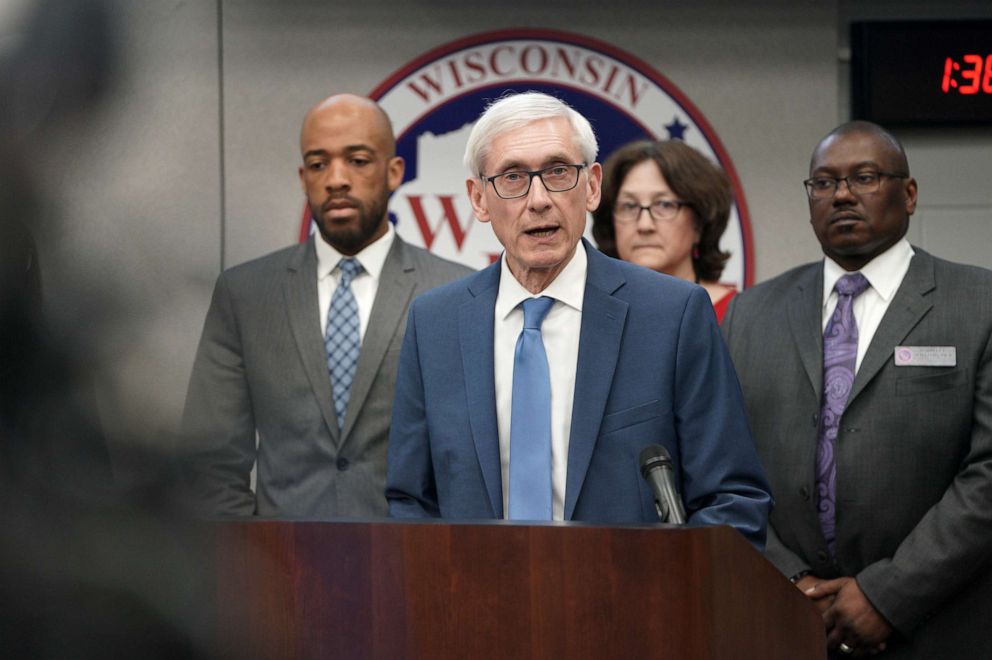
In Wisconsin, another midwestern battleground state Trump claimed victory in 2016, Gov. Evers expressed similar gratitude when the Badger State was granted a Major Disaster Declaration on Saturday.
“I am grateful for the swift action of the federal government in reviewing our request for a major disaster declaration,” Gov. Evers said in a statement. “The assistance granted today will help ensure Wisconsin can gain access to critical assistance as we continue our work to respond to this pandemic.”
Still, Evers is working to secure the resources needed to combat the spread of the virus.
In a letter addressed to FEMA Administrator, Peter Gaynor, last month, Evers described the personal protective equipment delivered from the Strategic National Stockpile as being “woefully inadequate” to meet the state’s needs. Evers added that some critical materials, including testing supplies, “appear to be stuck in the queue at the National Response Coordination Center.”
As of Thursday, Evers’ office indicated it received the second phase of the requested personal protective equipment from the national stockpile, but the deliveries still lagged behind the necessary amounts requested for some of the equipment.
President Trump has not critiqued Evers in his calls for more assistance, despite Evers’ requests echoing those of other Democrat governors.
In a statement to ABC News, Trump Campaign Principal Deputy Communications Director Erin Perrine pushed back on any notion of political calculus being at play.
"President Trump has been clear -- through actions and words -- that what matters most is the health and safety of every American. This crisis is hitting Americans -- not Democrats or Republicans," Perrine said.
"He has made sure that the hardest hit states receive the resources necessary from the federal government including Naval Hospital ships, ventilators, and PPE. His priorities are clear -- to lead America through this crisis and bring our nation back stronger than before after. To try and politicize this crisis in terms of the election is ludicrous," she added.
Trump appears to take a different tone with some battleground GOP governors
As Evers and Whitmer assess the shortage of some of their states’ federally distributed resources, the requests coming out of the battleground state of Florida, an emerging CoVid-19 hotspot, were answered in full.
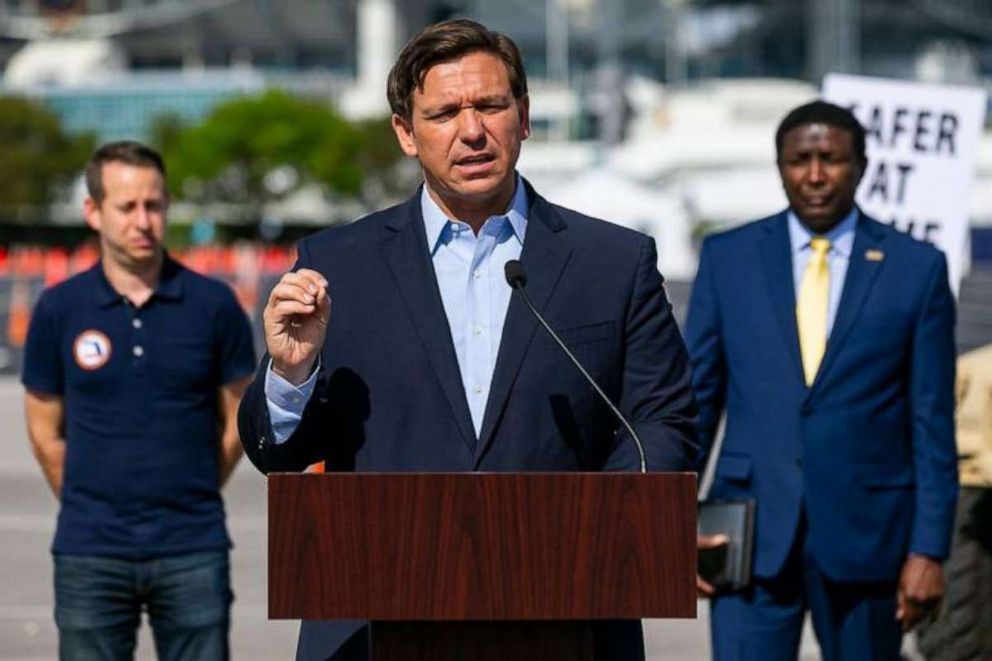
According to Florida Governor DeSantis’ office, the state’s March 11 request for resources -- including 430,000 surgical masks, 180,000 N95 masks, and more than 230,000 pairs of gloves -- were fulfilled within three days. An identical shipment was received less than two weeks later, and as of Wednesday, a third shipment with the same amount of supplies was in the process of being fully delivered.
"Great governor,” the president said of DeSantis, a close ally, at a press conference last week. “Knows exactly what he’s doing."
Despite the praise, DeSantis spent weeks fielding criticism from state Democrats for not being aggressive enough to stop the spread of coronavirus.
On the 2020 front, Biden issued a statement in which he referred to the “absence of leadership from President Trump and his Administration” before adding that “Floridians deserve science-based action from Governor Ron DeSantis.”
As many of his counterparts across the country implemented stringent mandates, DeSantis kept Sunshine State beaches open through spring break season, delayed closing down businesses, and resisted issuing a stay-at-home order for his constituents as CoVid-19 cases spiked.
“While other large states continue to take strong, urgent, and sweeping action to stop the spread of COVID-19, Florida has not,” Biden added in the statement.
A day after the White House released data projecting the death toll in the U.S. to reach between 100,000 and 250,000, DeSantis reversed his decision and issued a stay-at-home order. At a Wednesday press conference, DeSantis also noted that he spoke with the president about the decision.
"I did consult with folks in the White House. I did speak with the president about it," DeSantis said. "He agreed with the approach of focusing on the hot spots but at the same time, you know, he understood that this is another 30-day situation and you gotta just do what makes the most sense."
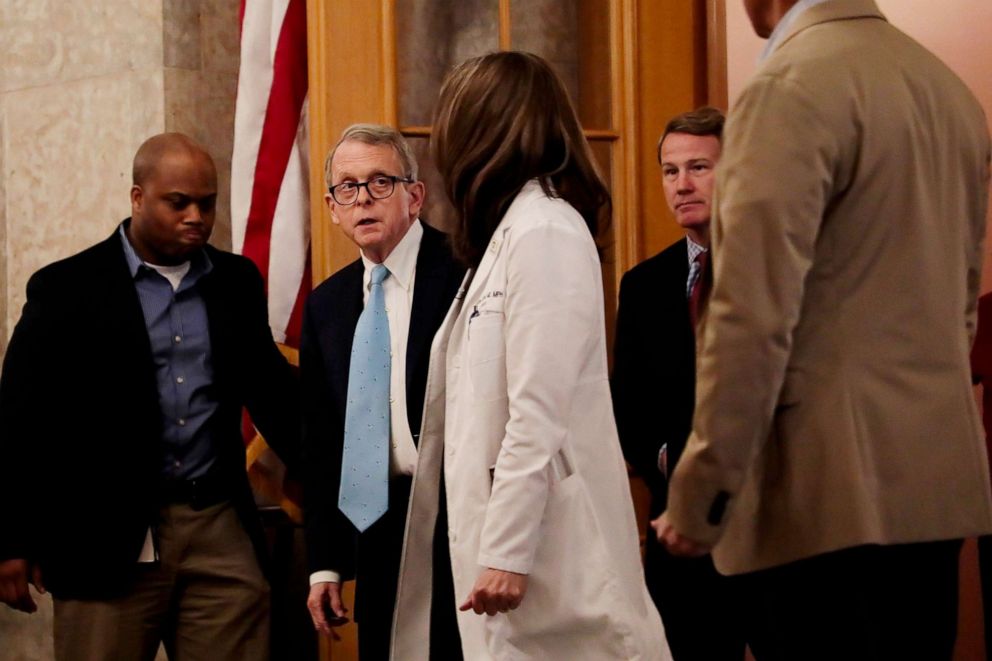
President Trump has also issued strong support for Republican Ohio Governor Mike DeWine whom he frequently mentions in coronavirus task force briefings.
Las week, the president praised DeWine’s efforts to lift FDA restrictions on an Ohio-based company’s ability to utilize surgical mask sterilization technology.
“I got a call from Mike DeWine, the governor of Ohio -- and he’s a tremendous guy, a tremendous governor,” the president said. “He said, ‘we have a company named Battelle, and they’re having a hard time getting approval from the FDA.”
The president went on to say that he personally called FDA Commissioner Stephen Hahn to resolve the issue and “within a very short period of time, [the company] got the approval.”
Although the president frequently praises the Buckeye State governor and considers him an ally, DeWine’s governing decisions don’t always align perfectly with Trump’s assertions. While the president has yet to institute a nationwide stay at home order, DeWine was one of the first governors to mandate strict social distancing guidelines that included delaying Ohio’s primary election.
Conducting an election during an “unprecedented health crisis...would force poll workers and voters to place themselves at an unacceptable health risk of contracting coronavirus” DeWine tweeted at the time.
While the president called the move “not a very good thing,” he did not directly criticize DeWine and said he would leave the decision to postpone elections to the states.
“Trump is a is an old-fashioned politician even though he doesn't think of himself that way,” Sabato says. “It's ‘scratch my back I'll scratch yours’.”
What’s next on the campaign trail?
For now, politicians on both sides of the aisle, and across the government, are indicating they prefer to stay away from partisan bickering as much as possible, but maintaining an apolitical stance could become more difficult as the election year goes on.
As President Trump continues to warn governors that the federal government should serve as a backstop to states’ own efforts to gather equipment necessary to combat the spread of CoVid-19, the ongoing crisscross could shed light on the political messaging voters will likely have to digest ahead of November.
“We appreciate all of the great assistance from the governors and people within the states. The relationships have been, really, very good,” President Trump said at a press conference on Saturday.
Later in the same press conference, the president appeared to reverse course by comparing the ways California Gov. Gavin Newsom and New York Gov. Andrew Cuomo responded to his administration’s support efforts in each governor’s respective state. Newsom, the president said, “has been gracious” whereas, he suggested, Cuomo had not been.
Pressed by reporters to answer why being gracious matters in terms of getting supplies from the federal government, the president appeared to reverse course yet again by saying it doesn’t.
“He has to work with the governors to a certain extent,” Sabato said. “Though, it has to be said, he knows very well that he will never win Washington state or California or New York or New Jersey or Connecticut -- the two that matter to him are Michigan and Florida.”
ABC News' Will Steakin contributed to this report.




